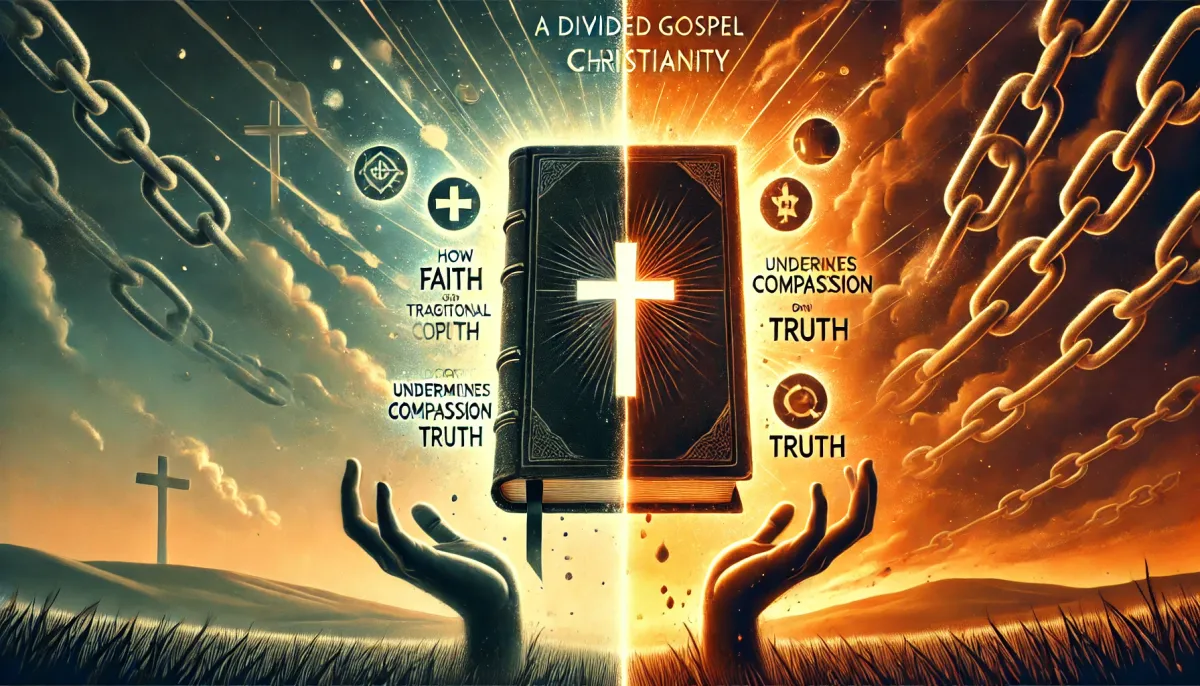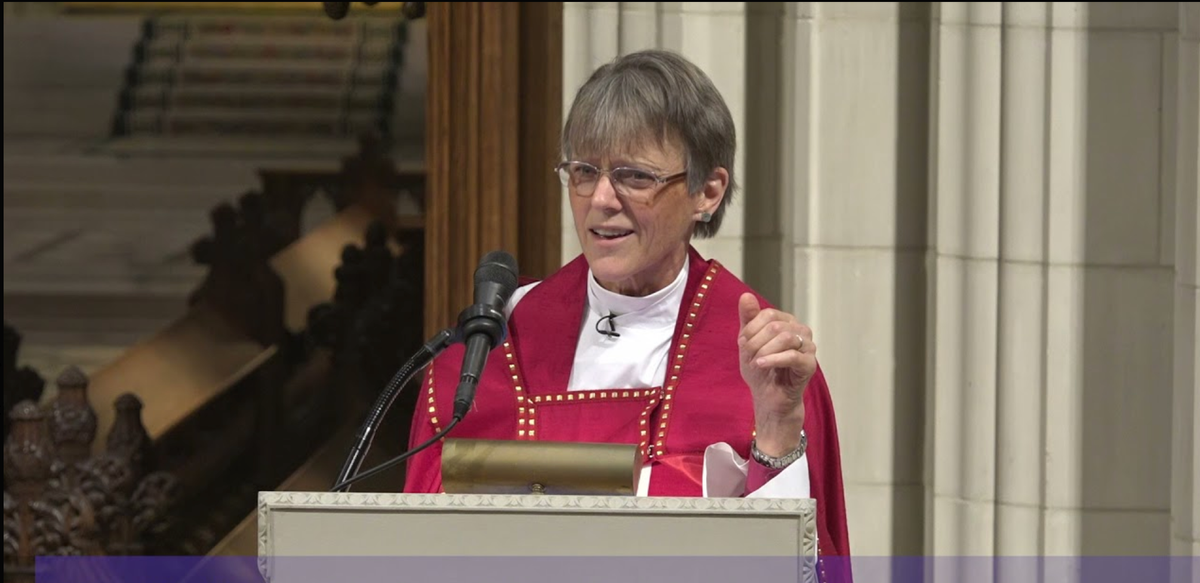

By Dr. Tim Orr
The sermon delivered by Episcopal Bishop Mariann Edgar Budde at the Washington National Cathedral following President Donald Trump’s inauguration was heralded in progressive Christian circles as a compassionate call for justice. Budde appealed to the president—and, by extension, the nation—to show empathy and solidarity with marginalized communities, including immigrants, LGBTQ+ individuals, and others often left on the fringes of society. However, the sermon also ignited a firestorm of criticism, particularly from evangelical Christians, who saw in it a reflection of progressive Christianity’s tendency to conflate the gospel with cultural conformity and political activism.
While progressive Christians often paint themselves as countercultural, a deeper examination reveals that their movement often aligns with and reinforces the values of secular society. This self-perception as a radical force for justice and inclusion is contradicted by their near-total adoption of the moral frameworks promoted by cultural elites. George Yancey and Ashlee Quosigk’s book One Faith No More sheds light on this phenomenon, offering critical insights into why progressive Christianity’s claim to countercultural authenticity is ultimately hollow and why it undermines the transformative power of the gospel.
The Myth of Progressive Counterculturalism
Progressive Christians often see themselves as prophetic voices, challenging systems of power and privilege in the name of justice and inclusion. Bishop Budde’s sermon, which criticized perceived injustices and championed the rights of marginalized groups, reflects this self-image. Progressives cast themselves as heirs to the biblical prophets, standing against the powers that be and advocating for those on the margins. However, a closer analysis shows that this "countercultural" stance is more often a reflection of mainstream cultural values than a challenge.
Cultural Alignment Rather Than Resistance
Rather than resisting cultural trends, progressive Christianity tends to adopt the moral and ideological frameworks of secular society. Issues like LGBTQ+ inclusion, abortion rights, and racial justice—while important in their own right—are often framed by progressives using the language of contemporary liberal ideologies, such as intersectionality and critical theory. While these frameworks claim to seek justice, they are rooted in secular worldviews that prioritize human autonomy, relativism, and power dynamics over biblical authority (Yancey & Quosigk, 2021).
Yancey and Quosigk argue that progressive Christians often lack distinctiveness from the secular left. Their theological and moral positions frequently mirror those of cultural elites, including academia, entertainment, and corporate institutions. This alignment raises the question: How can a movement be countercultural when it is largely indistinguishable from the dominant values of the culture it claims to critique?
A Prophetic Voice Without a Biblical Foundation
The biblical prophets were countercultural not because they aligned with societal trends but because they called both the powerful and the marginalized to repentance before a holy God. Their message was grounded in divine revelation, not the prevailing ideologies of their time. By contrast, progressive Christianity’s “prophetic” voice often fails to challenge the cultural idols of autonomy, self-expression, and moral relativism. Instead of pointing people to the transcendent truth of the gospel, progressive Christians frequently affirm the cultural norms that oppose biblical teaching (Yancey & Quosigk, 2021).
For example, progressive Christians who advocate for LGBTQ+ inclusion often argue that affirming same-sex relationships is an act of love and justice. Yet this argument is based on a secular understanding of love as an unconditional affirmation rather than the biblical understanding of love as rooted in truth and righteousness. This redefinition of love aligns with cultural norms. Still, it fails to offer the gospel's transformative power, which calls all people—regardless of their background or identity—to repentance and new life in Christ.
Cultural Validation as the New Orthodoxy
Progressive Christianity’s alignment with cultural values is not merely incidental; it often becomes a source of validation and identity. Progressives frequently seek affirmation from cultural elites, framing their faith as enlightened, inclusive, and intellectually sophisticated. This desire for cultural validation leads to a selective reading of Scripture, where passages challenging contemporary moral norms are downplayed or reinterpreted.
This dynamic was evident in the response to Bishop Budde’s sermon. Those who value compassion and inclusion praised her emphasis on compassion and inclusion, but there was little acknowledgment of the biblical call to repentance or the reality of sin. By focusing solely on the affirming aspects of the gospel, progressive Christianity risks reducing the faith to a reflection of the culture rather than a challenge to it.
The Evangelical Commitment to True Counterculturalism
In contrast to progressive Christianity’s cultural alignment, evangelical Christians embrace a countercultural stance rooted in Scripture and centered on the gospel. Evangelicals recognize that the Christian faith will always be at odds with the world’s values, as Jesus Himself warned: “If the world hates you, keep in mind that it hated me first” (John 15:18, New International Version). This countercultural posture is not about seeking opposition for its own sake but about remaining faithful to biblical truth in the face of cultural pressure.
A Gospel That Challenges All Cultures
The gospel is inherently countercultural because it challenges all people—regardless of their cultural or ideological background—to surrender their lives to Christ. This includes calling out sin, even when it is unpopular or politically inconvenient. While progressive Christians often emphasize structural sin (e.g., racism, inequality), evangelicals also emphasize personal sin and the need for individual repentance. This holistic understanding of sin and salvation makes the gospel a transformative force transcending cultural boundaries (Yancey & Quosigk, 2021).
Compassion Rooted in Truth
Evangelicals understand that true compassion is inseparable from truth. While progressive Christianity often equates compassion with unconditional affirmation, evangelicals see compassion as a call to align people with God’s will. This includes extending grace to sinners while lovingly pointing them to the gospel's transformative power. For evangelicals, compassion is not about affirming cultural norms but about offering the hope of salvation through Christ (Yancey & Quosigk, 2021).
Faithfulness Over Cultural Approval
Evangelicals prioritize faithfulness to God over cultural approval. This does not mean rejecting engagement with culture but approaching it with discernment and courage. Evangelicals recognize that the Church’s mission is not to reflect the culture but to proclaim the gospel in ways that challenge and redeem it. This commitment to faithfulness is what makes evangelical Christianity truly countercultural.
A Warning to Progressives: Losing the Gospel
Progressive Christianity’s attempt to act as a countercultural movement is ultimately self-defeating. By aligning so closely with the values of secular society, progressives risk losing the distinctiveness of the gospel. A faith that mirrors the culture cannot offer the hope, transformation, and redemption the world desperately needs. As Yancey and Quosigk point out, the progressive drift away from biblical authority and gospel-centered theology leaves the movement ill-equipped to address our time's deeper spiritual and moral crises (2021).
Conclusion: Rediscovering the True Countercultural Gospel
The response to Bishop Budde’s sermon highlights the divide between progressive and evangelical Christians, but it also reveals the urgent need for a rediscovery of the true countercultural gospel. A gospel grounded in Scripture, centered on Christ, and rooted in truth will always stand in contrast to the world’s values. Evangelicals must continue proclaiming this gospel with boldness and love, offering hope and transformation to a culture searching for meaning but lost in moral confusion.
While progressive Christianity may claim the mantle of counterculturalism, evangelicals are truly challenging the culture by remaining faithful to the timeless truths of Scripture. By holding fast to the gospel, the Church can fulfill its mission to be a light in the darkness, a city on a hill that points the world to the hope found in Christ alone.
References
Yancey, G., & Quosigk, A. (2021). One faith no more: The transformation of Christianity in red and blue America. New York University Press.
New International Version. (2011). Holy Bible. Zondervan
Tim Orr is a scholar of Islam, Evangelical minister, conference speaker, and interfaith consultant with over 30 years of experience in cross-cultural ministry. He holds six degrees, including a master’s in Islamic studies from the Islamic College in London. Tim taught Religious Studies for 15 years at Indiana University Columbus and is now a Congregations and Polarization Project research associate at the Center for the Study of Religion and American Culture at Indiana University Indianapolis. He has spoken at universities, including Oxford University, Imperial College London, the University of Tehran, Islamic College London, and mosques throughout the U.K. His research focuses on American Evangelicalism, Islamic antisemitism, and Islamic feminism, and he has published widely, including articles in Islamic peer-reviewed journals and three books.
 Dr. Tim Orr's BlogDr. Tim Orr
Dr. Tim Orr's BlogDr. Tim Orr
